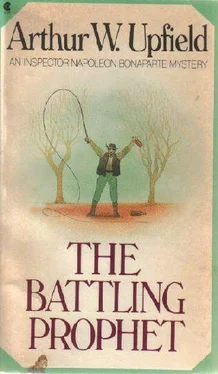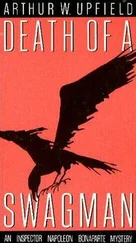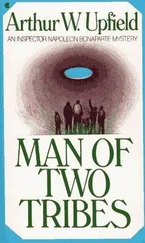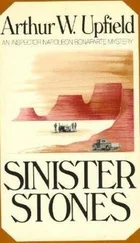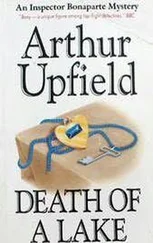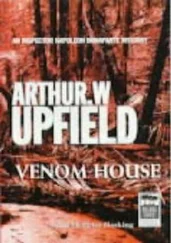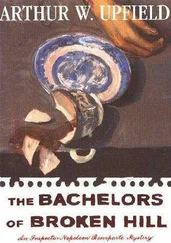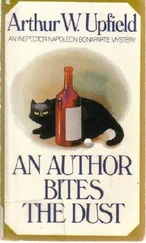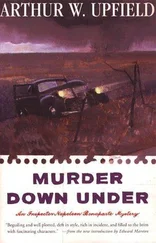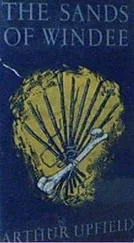Arthur Upfield - Battling Prophet
Здесь есть возможность читать онлайн «Arthur Upfield - Battling Prophet» весь текст электронной книги совершенно бесплатно (целиком полную версию без сокращений). В некоторых случаях можно слушать аудио, скачать через торрент в формате fb2 и присутствует краткое содержание. Жанр: Классический детектив, на английском языке. Описание произведения, (предисловие) а так же отзывы посетителей доступны на портале библиотеки ЛибКат.
- Название:Battling Prophet
- Автор:
- Жанр:
- Год:неизвестен
- ISBN:нет данных
- Рейтинг книги:4 / 5. Голосов: 1
-
Избранное:Добавить в избранное
- Отзывы:
-
Ваша оценка:
- 80
- 1
- 2
- 3
- 4
- 5
Battling Prophet: краткое содержание, описание и аннотация
Предлагаем к чтению аннотацию, описание, краткое содержание или предисловие (зависит от того, что написал сам автор книги «Battling Prophet»). Если вы не нашли необходимую информацию о книге — напишите в комментариях, мы постараемся отыскать её.
Battling Prophet — читать онлайн бесплатно полную книгу (весь текст) целиком
Ниже представлен текст книги, разбитый по страницам. Система сохранения места последней прочитанной страницы, позволяет с удобством читать онлайн бесплатно книгу «Battling Prophet», без необходимости каждый раз заново искать на чём Вы остановились. Поставьте закладку, и сможете в любой момент перейти на страницу, на которой закончили чтение.
Интервал:
Закладка:
The gunman stared down at her. He commanded her to get up, but Alice was presumably in a dead faint. He again ordered Mr. Luton to come from his room, and although the conversation between Alice and the policeman had told him Mr. Luton was abed with a cold, he did not know which of the rooms off the living-roomwas Mr. Luton’s bedroom.
He could not continue to point his automatic at a woman collapsed in a faint. He could not menace a man who refused to appear. This situation wasn’t taken care of when the stick-up rules of procedure were laid down by the gunmen’s union.
There was a jug on the wash bench close to the tap, and the gunman was kidded by the old-fashioned theory that to bring a woman from a faint you dashed cold water over her. He moved towards the bench. That was fatal.
It was as though Alice McGorr was shot out of a gun at a fair. She sprang from the floor to the gunman. The gun exploded and arched through the air to land on the floor beside Bony. The gunman rose in the air, too, as far as the ceiling would permit. He was coming down most ungracefully when each ankle was grasped by a hand, and each leg pulled as far apart as a human frame can span. Then he was on his back, and the instep of a shoe was gouging hard into his throat. He began to object, but the split of his legs was widened a fraction beyond possible. He did shout something before realising that surrender was indeed the best policy.
“Bravo, Alice!” Bony cried.
“You wouldn’t read about it,” chortled Mr. Luton stepping from his room, and Alice said brightly:
“I don’t think I’ll ever leave the Police Force. It’s always such fun.”
Chapter Twenty-three
In The Feminine Manner
ANinterior water-pipe between the living-room window and the wash bench, and Alice’s handcuffs, produced no discomfort while the prisoner was seated on the floor.
Small in stature, he wasn’t small in courage. For the first half-hour his will-power was strong enough to resist Bony’s questioning, supported by Alice. And this brought afternoon tea-time, which, in Australia, is sacred to the god of leisure.
In the Iron Curtain countries they use drugs and implements to make a man talk. In the United States they employ bright light and relays of questioners. In Australia, if a criminal won’t talk, they give him afternoon tea; in other words, leisurely soften him with kindness. It is a sad fact that these several methods of extracting information, based no doubt on scientific research and study, were ever man-controlled. Huge steam hammers to crack eggs! But interrogation by women!
Alice addressed the prisoner on the floor:
“I’m giving you a cup of tea and a slab of cake. If you swill tea on the floor, I’ll smack your face.”
The prisoner, who had shown silent hostility under polite questioning, glared at Alice when she stooped to place the cup and plate on the floor beside him. It is probable that he would have withstood the steam hammers applied with such labour by real he-men with brains. Since he had risen to and descended from the ceiling, he hadn’t uttered one word.
At the conclusion of the afternoon tea-break, Alice nodded to the sitting-room, and Bony and Mr. Luton accepted the hint and withdraw. There Bony again examined the contents of the prisoner’s wallet, which told them little more than that the prisoner’s name was Tolnic, which could be of Slavonic origin. The suitcase did contain a few packets of soap, boxes of pins and the like.
Into Bony’s concentration crept Alice’s voice, raised to that shrillness she had used to annihilate the callers. The voice rose to a screaming jumble of abuse, dropped to a nasal whine, and continued. The diatribe was punctuated by the clatter of pots and pans and the banging of what could be a rolling-pin on a pastry board.
Bony watched the clock. When he glanced at Mr. Luton, he saw the old man frowning and wincing.
“Glad I’m not married,” avowed Mr. Luton, and Bony smiled thinly.
It wasn’t only what Alice was saying to the unfortunate prisoner with such remarkable verbosity; it was the timbre of the voice, which seemed to pierce a man’s head like the point of a surgeon’s probe. Down through the ages, millions of men have heard this voice, going on and on and on until the mind reels and the stomachsuffers as though from the effect of a rough sea.
Mr. Luton rose and closed the door. Bony smiled as he returned to his chair. Mr. Luton closed his eyes and groaned, because the door made no difference. Through it, through a brick wall, through sheet steel that voice would penetrate.
Aware of the purpose of the domestic nagging which, possibly, is the cause of thirty murders in every hundred, Bony became entranced by the raw phrases, the inane questions, the ridiculous charges, the atrocious innuendoes. And, above all, the astounding sincerity of Alice’s performance. There wasn’t any doubt that a man was being verbally lashed by a furious spouse.
Mr. Luton exploded. “I can’t stand it. It’s worse than the hoo-jahs. Can I go outside, Inspector? Ought to chop a bit of wood.”
“No, Mr. Luton. It’s likely there are confederates outside.”
“But when’s shegoin ’ to stop?”
“When the prisoner breaks. It’s her intention to break him.”
“But she doesn’t know him,” argued the old man. “He’s not married to her, is he?”
“No, and if he’s not married now, he never will be,” chuckled Bony.
Still accompanying the terrible voice were crashes and bangs, the clatter of tin-ware, the slam of the oven door. Never ceasing, on and on and on, skewering through your brain, the endless insults, the endless accusations. Rising, falling, swirling, snarling streams of words. Nothing mattered save the shrill voice with the relentless wailing-whine. On and on and on!
Now and then the prisoner shouted. The effect on the voice? Not the slightest. A rhythmic noise, produced by the handcuff on the ankle being pounded against the pipe, was as the feet of King Canute opposed to the waves. Mr. Luton paced the sitting-room, sometimes his hands pressed against his ears, sometimes his teeth biting upward at his moustache. Bony wanted to burrow his head into something, but the linoleum was tacked to the floorboards.
On and on and on! Shrill piercing, hammering at the mind with twenty million blows to the minute. The uselessness of walls and doors to shut it out! The naked defencelessness of the brain!
One hour and six minutes did the trick. The prisoner was screaming “Stop!” Bony opened the door to the living-room, where Alice was still talking and the prisoner watching her with mouth agape and eyes glassy.
“I tell! I speak!” he moaned.
“Of course you’ll tell,” snarled Alice. “I can go on till to-morrow night without stopping. And I will, too. If you’d lived in our street when I was a kid you’d have talked an hour ago. You tell now, or else!”
“Your name?” asked Bony. “And address?”
“IvorTolnic. Two-nine Alford Street, Hindmarsh.”
“Why did you come here threatening bodily injury?”
He was an illegal immigrant. When he had jumped his ship at Port Adelaide, he thought he had jumped his country. That was five years back in history. An engineer, he had obtained work as a cleaner in an engineering shop, had joined a union, had married, was buying a home. Then his country had caught up with him.
Tolnic was stopped in the street when going home from work the previous day. The man he did not know. He was told what to do, and what would happen, either way. The man, British, spoke like an Australian. In the car, two men. They were non-British. All three men knew everything about him. No, his name hadn’t been Tolnic on the ship, or in his own country, but they knew it.
Читать дальшеИнтервал:
Закладка:
Похожие книги на «Battling Prophet»
Представляем Вашему вниманию похожие книги на «Battling Prophet» списком для выбора. Мы отобрали схожую по названию и смыслу литературу в надежде предоставить читателям больше вариантов отыскать новые, интересные, ещё непрочитанные произведения.
Обсуждение, отзывы о книге «Battling Prophet» и просто собственные мнения читателей. Оставьте ваши комментарии, напишите, что Вы думаете о произведении, его смысле или главных героях. Укажите что конкретно понравилось, а что нет, и почему Вы так считаете.
